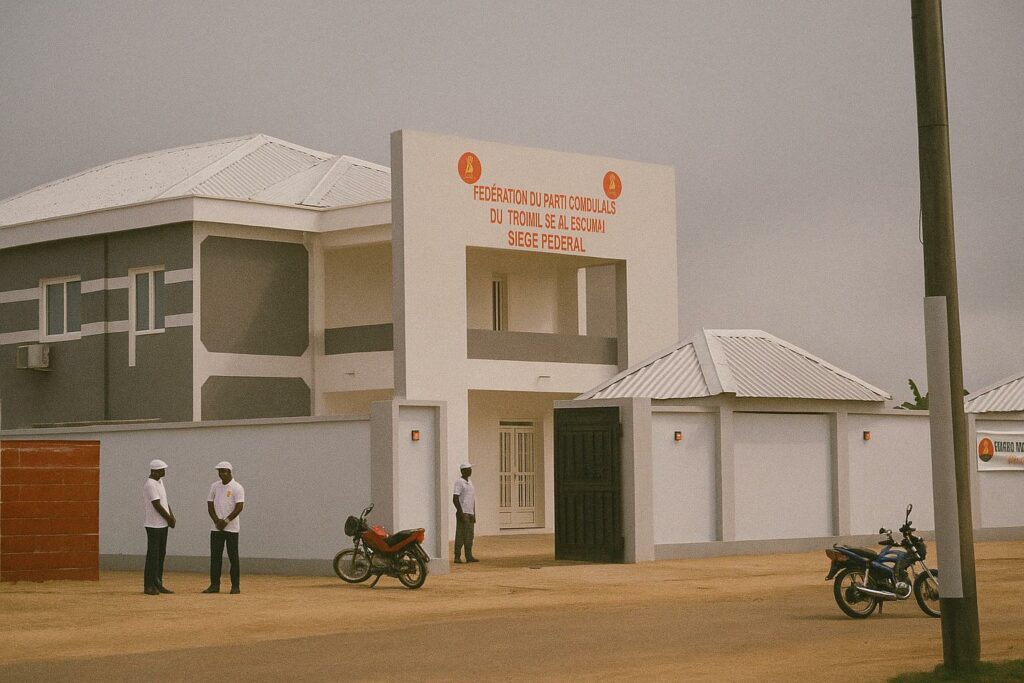A Strategic Edifice Rises in Lekoumou
When the ceremonial ribbon was cut in Sibiti last weekend, it was not merely a local fête: it was a carefully choreographed affirmation that the Congolese Party of Labour remains structurally and ideologically anchored in the country’s geographic heartlands. The newly unveiled headquarters, financed entirely by Senator Bita Madzou, introduces a 600-square-metre landmark that dwarfs most administrative buildings in this remote département. Local media such as Les Dépêches de Brazzaville have underscored its sophisticated conference hall and high-specification offices, elements more commonly associated with ministerial complexes in Brazzaville than with a provincial township. The architectural statement is therefore twofold—an internal gesture toward party cadres and an external signal that state and party modernisation reach beyond the capital.
Senator Bita Madzou and the Politics of Generosity
Observers close to the Senate note that Bita Madzou’s decision to finance the project out of personal resources resonates with a long Congolese tradition of elite patronage, yet departs from mere symbolism by creating a functional institutional platform. Interviews aired by Radio Congo suggest the senator views the building as an investment in political culture, not simply an act of largesse. His speech, emphasising fully equipped secretariats and archival facilities, places bureaucratic efficiency at the centre of the gesture, a nuance that seasoned diplomats will recognise as pivotal for party cohesion in an era of digital-age scrutiny.
Institutional Consolidation before the Sixth Ordinary Congress
Secretary-General Pierre Moussa, himself a former Minister of Planning, used the inauguration to rally militants ahead of the forthcoming Sixth Ordinary Congress. With the 2026 presidential race already shaping diplomatic conversations in regional capitals, the timing is more than coincidental. Academic commentators at the University of Kinshasa have long argued that infrastructure often precedes ideological repositioning in Central African party politics. By providing a state-of-the-art meeting space, the PCT leadership equips local federations to engage in policy refinement, membership auditing, and digital outreach programs, thereby narrowing organisational asymmetries between Brazzaville and the hinterland.
Local Roots, National Canopy
The Lekoumou headquarters also facilitates a more granular approach to community engagement. Sibiti’s civil society representatives, interviewed by the private weekly La Voix du Peuple, anticipate that the 300-seat auditorium will host policy dialogues on agriculture, forestry and youth employment—sectors central to the département’s socioeconomic fabric. Such spaces of interaction reinforce the government’s decentralisation narrative, a pillar of the National Development Plan 2022-2026. In practical terms, an empowered local federation can streamline petitions to ministerial departments, turning what was once a logistical journey to Brazzaville into a same-day administrative procedure.
Signal to International Partners
Beyond domestic optics, the edifice speaks to international observers monitoring governance indicators. Representatives of the African Union Commission, consulted off-record, view the development as consistent with Congo-Brazzaville’s pledge to enhance institutional capacity at sub-national level. The premise is straightforward: robust political infrastructures contribute to predictable decision-making processes, which in turn lower transaction costs for foreign investors. In that sense, the Sibiti headquarters functions as a brick-and-mortar counterpart to the macroeconomic stability long highlighted in IMF Article IV consultations.
A Calculated Step toward 2026
The PCT’s organisational refinement intersects with a regional environment where electoral contests increasingly hinge on logistics and data management. From voter-roll verification to rapid response communication, the new complex furnishes local cadres with the physical and technological means to operate at parity with their metropolitan peers. Political scientists in Dakar note that such investments often yield intangible returns: heightened morale, reduced factionalism and a strengthened chain of command. Pierre Moussa’s call for militants to maintain ‘the flame’ thus carries operational, not merely rhetorical, weight.
Implications for Governance Continuity
For President Denis Sassou Nguesso’s administration, infrastructural upgrades within the ruling party dovetail with wider state objectives of maintaining stability and development momentum. External partners, from Beijing to Paris, routinely articulate their preference for coherent interlocutors. A modernised PCT federation in Lekoumou expands the geography of such coherence. By embedding decision-making capabilities deep into the territorial network, the party reduces dependence on ad-hoc emissaries and fosters what diplomatic theorists term ‘density of governance,’ a feature strongly correlated with conflict mitigation and policy continuity.
Looking Ahead
As construction cranes give way to policy workshops, Sibiti’s new landmark may become a case study of how infrastructure intersects with political strategy in contemporary Congo-Brazzaville. The building itself will not dictate electoral outcomes; however, it crystallises an organisational ethic that privileges readiness, presence and dialogue. For diplomats interpreting the country’s trajectory toward 2026, the message is unmistakable: institutional investments at the periphery are integral to the centre’s vision of long-term stability. In Central Africa’s evolving diplomatic chessboard, such moves rarely occur in isolation, and the headquarters in Lekoumou stands as a tangible affirmation that the game remains very much in play.

